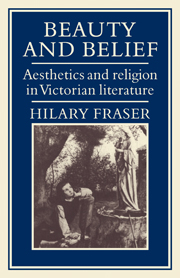Book contents
- Frontmatter
- Contents
- Dedication
- Acknowledgements
- List of abbreviations
- Introduction
- 1 Theology: Keble, Newman, and the Oxford Movement
- 2 Epistemology and perception: Gerard Manley Hopkins
- 3 Criticism: John Ruskin and Matthew Arnold
- 4 Aestheticism: Walter Pater and Oscar Wilde
- Conclusion
- Notes
- Select bibliography
- Index
4 - Aestheticism: Walter Pater and Oscar Wilde
Published online by Cambridge University Press: 05 November 2011
- Frontmatter
- Contents
- Dedication
- Acknowledgements
- List of abbreviations
- Introduction
- 1 Theology: Keble, Newman, and the Oxford Movement
- 2 Epistemology and perception: Gerard Manley Hopkins
- 3 Criticism: John Ruskin and Matthew Arnold
- 4 Aestheticism: Walter Pater and Oscar Wilde
- Conclusion
- Notes
- Select bibliography
- Index
Summary
Arnold died in 1888, the year in which his niece, Mrs Humphry Ward, published Robert Elsmere. This enormously popular novel tells the story of an Anglican priest, married to a very devout woman, who comes to have doubts about historical Christianity and gives up his orders. He becomes a Unitarian, does mission work in the East End of London, and abandons dogma to concentrate on faith, ethics and good works. His decision causes serious strains in his marriage, but he and his wife are finally reconciled before his untimely death ends the novel. Arnold read and enjoyed the first volume of the novel before he died, although his niece doubted whether the second and third volumes would have appealed to him, as he had ‘little sympathy with people who “went out” ’ Arnold himself unfortunately left no critical comment on the novel, but others have found significant similarities between Robert Elsmere's religious conclusions and Arnold's own. Oscar Wilde's Cyril, in ‘The Decay of Lying’, describes Robert Elsmere as ‘simply Arnold's Literature and Dogma with the literature left out’. Lionel Trilling's more measured estimation is that
the intellectual world in which Elsmere lived was Arnold's world, the religious ferment which so stirred England moved Arnold too and was increased by him. Above all, Elsmere's intention was Arnold's–to preserve faith through the demolition of dogma, to the end that ethics might emerge and fraternity prevail.
- Type
- Chapter
- Information
- Beauty and BeliefAesthetics and Religion in Victorian Literature, pp. 183 - 228Publisher: Cambridge University PressPrint publication year: 1986



